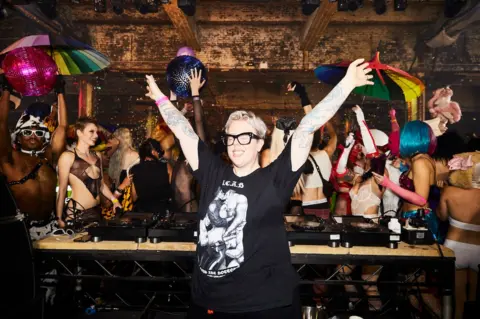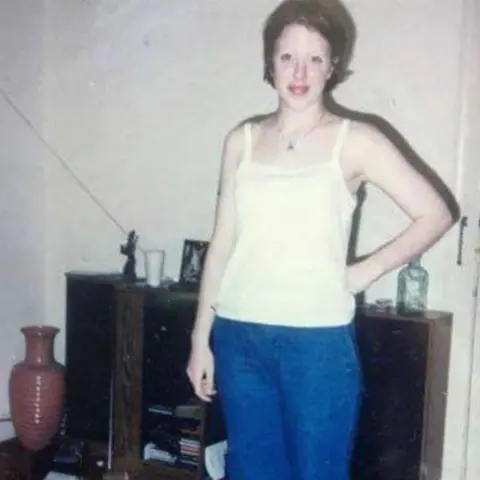 Eva Pentel
Eva Pentel23 September, 2024. Packing day.
Marea Stamper, aka DJ extraordinaire The Blessed Madonna, is cramming her belongings into well-worn suitcases, ahead of a forthcoming Australian tour.
There’s no stress. She’s done this thousands of times before, playing everywhere from Berlin’s legendary nightclub Berghain to the Coachella Festival, where she headlined the Mojave stage in 2022.
Sipping on an iced coffee (“if I could have this intravenously, I would”), Stamper is upbeat and fighting fit, despite a recent stay in hospital.
“I’ve been struggling with persistent anaemia for some time, and they finally decided to figure out why, so I had some outpatient surgery last week,” she explains.
“They really fixed me up. Otherwise, I would have died on this next tour.”
It’s no exaggeration to say that would have been a huge loss.
Stamper is one of the most celebrated DJs of her generation, spreading the gospel of dance music through her uplifting festival sets, while consistently breaking glass ceilings (in 2016, she became the first woman to be named DJ of the year by Mixmag).
Her Australian tour marks the fulfilment of a promise. Her last trip Down Under was cut short by Covid-19.
“I sprinted out of a hotel room to get onto a flight and come home,” she says, recalling both her last-minute panic, and the surprise of a heavily-discounted first class ticket on an empty plane.

With nightclubs shut down, she spent the pandemic remixing Dua Lipa’s Future Nostalgia album in her pyjamas; then scored a surprise hit when Fred Again sampled one of their conversations on his song (Marea) We Lost Dancing.
“We’ve lost hugs with friends and people that we love,” Stamper says over the track’s bubbling synths.
“If I can live through this next six months, day by day, what comes next will be marvellous.”
Serendipitously, the song helped Stamper secure a record deal with Warner Records. This Friday, she releases a star-studded debut album, Godspeed, which features Kylie Minogue, Joy Crookes and Jamie Principle.
It’s fair to say it’s been a long time coming.
Teenage rave queen
Stamper was born in 1977 and grew up in rural Kentucky, the first generation of her family to live outside of the Appalachian mountains.
Her father was the well-regarded blues musician Mike Stamper, and her mum, Louise Renee, was a librarian – but with little money coming into the household, Stamper was a high school outcast.
She once got detention for failing to show up with lunch money, and her appearance – “butch” attire, with her hair dyed purple and piled into a beehive – made her a target for bullies.
“I would get the crap kicked out of me every day,” she recalls, “so I was not particularly interested in going to school.”
Salvation came from (where else?) an episode of Beverly Hills 90210, where the cast visited a rave. Inspired, Stamper snuck into her first house party at the age of 14, and found her true calling.
“They had to peel me off the speakers,” she later recalled.
But her father was furious. A heavy drinker, he was in the middle of a seven-year stretch of sobriety and “aggressively wanted me to adopt the values of whatever rehab programme he was in,” Stamper recalls.
“He just said, ‘You can’t go to raves, you’re too young. All these people, you think they’re going to be your buddies, and you think they’re going to be there for you – but they won’t.'”
Looking back, she’s happy to confirm he was wrong.
“When my dad’s wife died a couple of years back, it was those rave degenerates who were there for me,” she says.
“They stuck with me and they fed me and put me back together. Our bond is deep, spiritual, forever.”
 The Blessed Madonna/Instagram
The Blessed Madonna/InstagramShe’s known some of them since she dropped out of school aged 16 to sell mixtapes out of the back of her car across the American Midwest.
Others helped her secure her first DJ sets in Chicago, initially as Lady Foursquare, then The Black Madonna.
Under that moniker, she started releasing music in 2012, gaining widespread acclaim for tracks like Exodus and the mountainous house anthem He Is The Voice I Hear.
By 2017, she had a 13-week, sold out residency at London’s XOYO club, and her own radio station in the video game Grand Theft Auto V.
Work on her album started around the same time. Stamper confesses it’s been scrapped and rewritten several times.
But one track has survived every incarnation: We Still Believe, a tribute to sweat-soaked warehouse raves that she wrote in her attic more than a decade ago.
“The first version has my little voice recorded on a BlackBerry, to give you a sense of how long ago it was.”
Before she could include it on the album, she had to reclaim the rights from the independent label who’d originally released it in 2013.
“They’d given me a really outstanding deal of, you know, ‘We’re going to control this in perpetuity for $300′ or whatever,” Stamper says, “but, at the time, I was just excited that anyone wanted to put my music out.”
After buying it back, she enlisted one of her heroes, Jamie Principle, to re-record the vocals – a love letter to the unifying power of dance music.
Principle, whose 1984 anthem Your Love is ground zero for Chicago house, also appears in a spoken-word interlude on the album, describing how the scene “went all to hell when the money came into it”.
Over the years, there have been accusations of unpaid royalties and ripped off songs. Stamper is disgusted.
“The guys who made these foundational records can’t get medical care,” she says.
“They have to have fundraisers to get a car fixed. Jamie Principle never made a dollar from any of his records.”
 Eva Pentel
Eva PentelThe impact of money on music is a theme she hammers on the album which opens, pointedly, with a Quincy Jones quote.
“God walks out of the room when you’re thinking about money.”
“That’s not an anti-money stance,” Stamper explains. “But you can’t go into the studio and try to make a record that you think is going to have a financial impact on you later.”
In a year where production-line projects from Katy Perry and Jennifer Lopez have failed to connect, she believes the charts are on the cusp of a “Nirvana moment”, where the old guard are swept away by new, authentic voices.
“There’s been a period of cheerleading for nothing,” she says, “a kind of sad populism that isn’t even about what’s populist.
“And suddenly there’s all this incredible pop music coming out, you know? Charli XCX and Chappell Roan, who have personal investment, personal storytelling, personal risk in their music.
“I think Brat is a genre-resetting moment in pop music.”
That’s why her album avoids the bland platitudes of most superstar DJ projects. You can hear Stamper’s roots, her personal struggles, and even her religious faith woven into the heart-pounding beats.
On the title track, she pays emotional tribute to the people she’s loved and lost, from Chicago underground legend Jojo Baby to the trailblazing female DJ Kelli Hand.
“Hand to God, I wrote those lyrics, completely asleep, on a notepad on tour,” she says, “and I completely forgot about them until we were two days away from handing the album in.”
Knowing she wanted to honour her heroes, á la Daft Punk’s Teachers, she flicked through her phone ’til she re-discovered that late-night stream-of-consciousness.
“And on the very last day, at the very last hour, it became the title track for the album,” Stamper says.
“And I swear to God, what day was it? Quincy Jones’s birthday!
“Sometimes when you’re making art, God just winks at you.”
